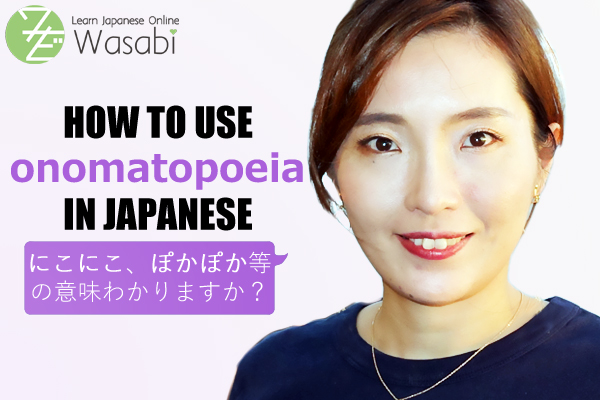How to use onomatopoeia in Japanese
Welcome back to another “Video & Article” series, this time for another live-stream with tutor Erika. In this live-stream we will take a look at onomatopoeic words in Japanese. These words phonetically imitate, resemble or suggest the sound they describe. While they exist in every language, use of onomatopoeia in Japanese is quite extensive. Let’s take a look at a few common onomatopoeic words in Japanese.
| Table of Contents [Introduction] [Examples] [Summary] |
[Introduction]
Onomatopoeia are words that try to phonetically imitate, resemble or suggest the sound of whatever they describe. Oftentimes, especially in Japanese, this is an attempt to suggest a sound of an action that does not actually have a sound. These words are called 擬音語 or 擬態語 in Japanese.
擬音語
An onomatopoeic word
擬態語
Mimetic word (there is no actual sound)
[adsense]
[Examples]
にこにこ
にこにこ is a mimetic word that expresses a person smiling. Of course, smiling people don’t really make a sound, but ニコニコ expresses the idea of what a smiling person could sound like.
Example:
彼女はいつもニコニコしてるね!
She is always smiling!
ぽかぽか
ぽかぽか expresses a comfortably warm feeling, like a warm spring day or a warm but not scorching hot bath.
Example:
春の陽気で体がぽかぽかするね!
My body feels warm and fuzzy because of the nice spring weather.
だらだら
だらだら expresses sloppiness and laziness. This could be used to describe an animal or a person. This word can be used as a sound word, but also in everyday conversation. A very similar word is のろのろ, which means slowly, or sluggishly.
Example:
だらだらしていないで勉強しなさい!(お母さんから息子に)
Don’t be lazy, go and study! (Mom to son)
のろのろ
運転
Driving slowly
もぞもぞ
もぞもぞ is a word that expresses wiggling, or stirring restlessly. Anything that is alive can “もぞもぞ”, be it a person or a worm. You will find this often as a “sound effect” in manga, but it’s also used in everyday conversation!
Example:
子供は退屈するともぞもぞしだす。
Children grow restless when they get bored.
ごろごろ
ごろごろ has two meanings. First, it expresses something or something rolling around on a surface. Second, it means someone rolling around on the floor being lazy. It basically means to chill out at home!
Example:
今日は家でごろごろします。
Today I’ll just chill at home.
きらきら
きらきら means that something is shining, sparkling, glittering or twinkling. That could be a person’s eyes or shiny objects such as metals, rocks or stars. This is used as a sound effect in manga, but also in everyday conversation.
Example:
星がキラキラ輝いている。
The stars are shining above.
[Summary]
You can use onomatopoeia and mimetic words to make your Japanese sound more lively and natural. There many of these words, and very few mime an actual sound, so you will need to learn them by heart or get accustomed to them by listening to a lot of Japanese. But it’s not impossible at all, and especially reading manga will make learning these a lot easier!
That’s it for today. If you have any questions, you can always clear them up by booking a lesson with one of our native Japanese tutors. See you next time!
| にこにこ(する) | Smile |
| ぽかぽか | Feeling warm throughout your body |
| だらだら | Sluggish, lazy |
| もぞもぞ | To be restless, to wiggle around |
| のろのろ | Slowly, sluggishly |
| ごろごろ | To roll around, to chill out |
| きらきら | To sparkle, twinkle, glitter, shine, etc. |





